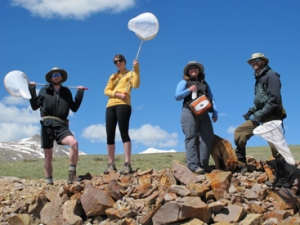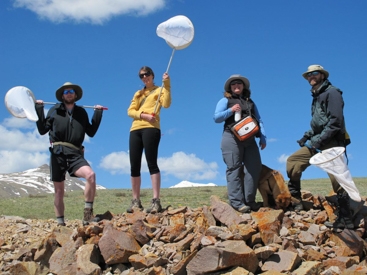Why did you become a biologist?
I am an ecologist and science teacher educator here at App State. My ecology work focuses on the population biology and ecology of plant-pollinator interactions. I took this path as a second career in life because I wanted more mental stimulation, and I wanted the opportunity for my "office" to be out in nature for at least part of the year! However, I also continue work as a science teacher educator because of the impact on students and society.
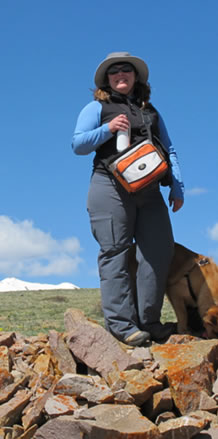 When did you know this was your career choice?
When did you know this was your career choice?
I took a very round-a-bout path to my career. All of my life, I loved school and every subject I encountered. During my senior year of high school, I randomly decided to study Agricultural Biochemistry because it was a fast-growing field, and I received a full ride at Iowa State University to study it. However, at the last minute I left behind all of my scholarships and enrolled in the state liberal arts school, University of Iowa. I had no idea what I wanted to do there, but I loved every class I took. I changed my major five times – starting in biochemistry and wandering aimlessly through pharmacy, English literature, and medical technology. None were a good fit. I finally gave up trying to figure it out, and did a year study abroad to Aberdeen, Scotland, and then took a year off to ponder my future. After (finally) consulting with an advisor – it wasn't mandatory to do so when I was an undergrad! – they told me I could finish fastest by putting all of my science credits toward a B.S. in secondary science education. I entered the program and found my match!
I spent eight years teaching middle level students in Columbia, Missouri, and completing my M.Ed. and part of an education Ph.D. at University of Missouri. Many of my friends at this time were biology graduate students, and I was so envious to hear about all of their work. I even helped one out with nectar data collection from Nicotiana (tobacco) plants in the middle of the night in the pouring rain. I thought it was a blast! Finally, I switched programs and completed my Ph.D. in biology – I was 39 when I graduated! I then found the perfect job here at App State that allows me to merge my two areas of expertise; I teach, mentor grad students, and conduct research in both science teacher education and ecology.
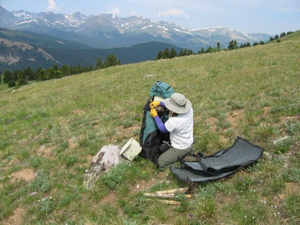 Where are you originally from and how did your childhood influence your career decision?
Where are you originally from and how did your childhood influence your career decision?
I am a Midwesterner at heart! I was born in Missouri and grew up in Iowa. Though my parents were highly educated, my dad was also a "hobby farmer" and we always lived in a rural environment. I spent all of my free time outside and had freedom to wander the countryside, which meant playing in creeks, collecting rocks, and hiding out in what were probably remnants of tall grass prairie. The TV was never on in our house as long as it was light outside! I'm not sure that my upbringing consciously influenced my career choices, but my comfort with nature and outdoors surely was a result of my childhood experiences.
What courses do you currently teach?
GS3300 Educational Applications of Science Concepts, GS4404 The Meaning and Nature of Science, and GS4403 Teaching in the Middle and High School. I have also taught introductory biology courses for majors and non-majors.
Are you planning to teach any new courses in the near future?
I would love to teach Population Ecology, a seminar about how math impacts biology, or a course in designing ecological experiments.
What do you like most about teaching?
I love those moments with I can create cognitive dissonance in my students' minds – i.e. when I structure an experience that has an outcome completely unanticipated by students. Sometimes it's just an idea, and sometimes it's a physical demonstration. I also love when I get to be present for students' "aha" moments – when they are struggling to wrap their minds around something, and then they finally get it. I love to scaffold students' thinking about a problem by asking questions that lead them through the thinking processes.
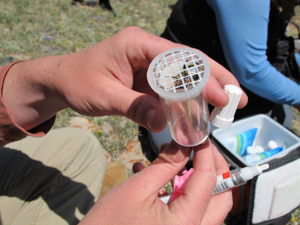 What do you like most about doing research?
What do you like most about doing research?
I love the challenge of figuring things out – like inventing and building contraptions for your ecological experiments because no one just sells that equipment. I love feeling really "tough" when I am collecting samples at some isolated mountain pass that is 12,500 ft above sea level, and your fingers are cracked and bleeding from the cold, dry air (in the middle of June or July). Then you look up and there's a herd of elk or some mountain goats that just appeared. I love that you almost always start out with data sets that seem really complicated and messy, but when you start to make graphs and run the appropriate statistical models, the questions that you asked suddenly have answers.
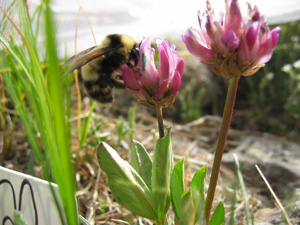 What advice do you have for undergraduates/graduates pursuing degrees in biology these days (or advice on how to be a successful student at App State)?
What advice do you have for undergraduates/graduates pursuing degrees in biology these days (or advice on how to be a successful student at App State)?
I relate to students who struggle in their undergraduate degrees, and I want to speak them first. I know from my own experiences that it can be hard to dedicate the needed work to your college degree unless you are sure it is what you want. My advice here is to not give up, even if you "mess up" early on. Take time off to mature, if needed, and figure out where you are going in life. Once you do that, dedication to studies comes naturally! Even graduate schools will overlook a couple years of terrible transcript grades if you demonstrate that you got your act together later.
My general advice for all biology students at App is to consciously cultivate a toolbox of skills that support your biology degree. GIS and molecular tools, for example, and species identification are real-life career skills. In addition, especially if you plan to continue to graduate school, don't shy away from math. Mathematics is now allowing us to untangle more and more complex aspects of biology and allowing us to make predictions about the way systems work at multiple scales. The most sought-after biologists are those that have both the skills to understand/develop the predictive models and see how this translates into empirical studies to test them.
Third, many biology students don't consider teaching as their first option. Getting some education "credentials" can only help you in the job market later, and many people don't realize they have a calling to teach until they try it. Teaching may not be the highest paid track, but it is the one with the best job security (100% placement post-graduation) and a guaranteed sense of contributing to society! If your personality includes a combination of intelligence, a great sense of humor, empathy, and high expectations, you probably have what it takes to become an excellent teacher. M.A.T. programs (Master of Arts in Teaching) are geared toward people with pure science bachelor's degrees that later decide they want to teach. There are also "lateral entry" paths to teaching certification, but they provide less preparation before entering a classroom.
